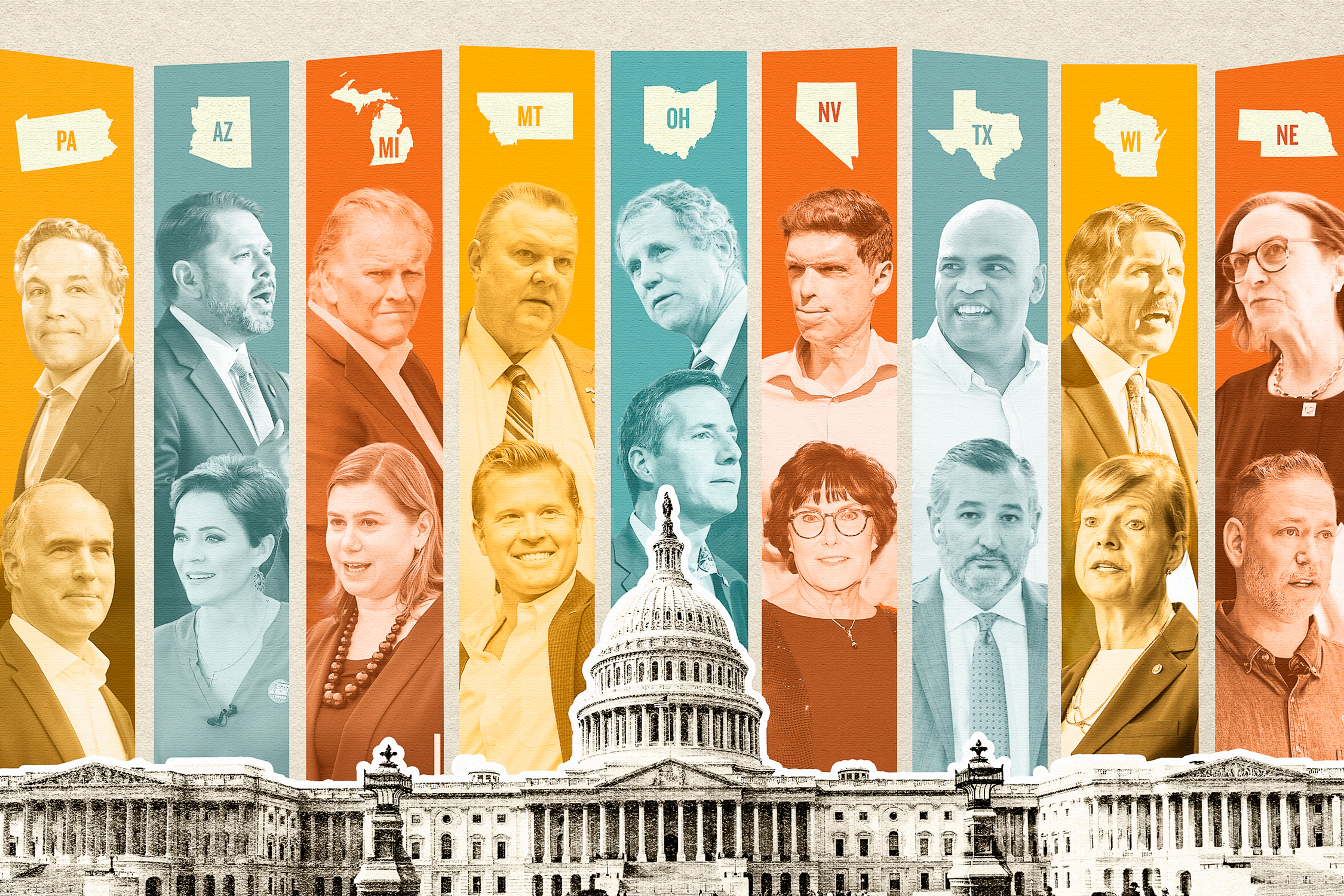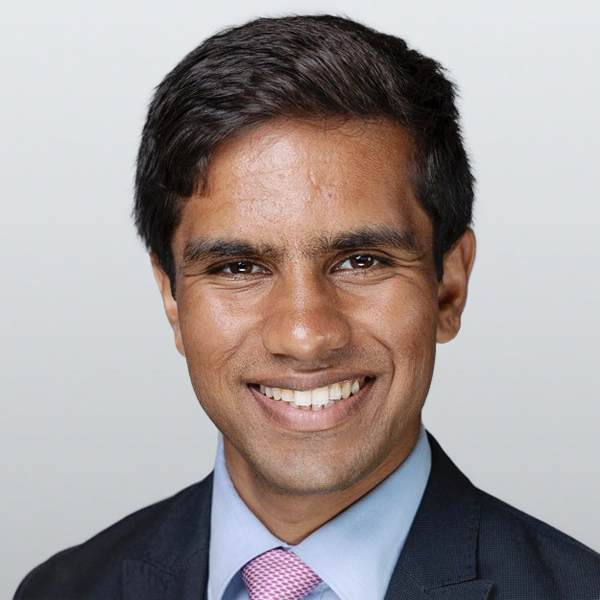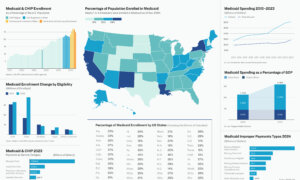On Nov. 5, a number of states will elect U.S. senators for new six-year terms starting in 2025. The winners will determine which party has a Senate majority for the next two years and so will be critical to the new president—especially for Cabinet and judicial nominations, each of which must be confirmed by the Senate.
Beyond nominations, the Senate majority will affect the productivity of Congress and influence the kind of legislation it passes, which makes these elections determinative of national politics.
Several incumbent senators running for reelection have only a narrow lead or trail their challengers.
Given the stakes involved, The Epoch Times lists the top states where 2024 Senate races merit national attention.
Pennsylvania
In the Keystone State, incumbent Sen. Bob Casey Jr. (D-Pa.) is running for reelection to a fourth term. Casey is the scion of a Pennsylvania political dynasty—his father, Bob Casey Sr., was governor from 1987 to 1995—and he has had a long career in commonwealth politics, serving as both treasurer and auditor general.
Running against Casey is Republican nominee David McCormick, an Army veteran who served as a deputy national security adviser and Treasury undersecretary to President George W. Bush. Most recently, he was the CEO of Bridgewater Associates, one of the world’s wealthiest hedge funds, founded by prominent investor Ray Dalio.
Polls show Casey ahead of McCormick by an average of 3.3 percentage points, according to RealClearPolitics. That figure is close to the margin of error, however, and some polls show them tied.
Republicans are counting on a strong turnout propelled by Republican presidential nominee former President Donald Trump, to take down Casey. Trump currently leads Democratic nominee Vice President Kamala Harris by a margin of 0.8 percentage points, on average, in the commonwealth.
Criticism of McCormick’s campaign has emerged because of his residence in Westport, Connecticut, while working at Bridgewater Associates. Although McCormick was born in a Pittsburgh suburb and owns a home in the area, Casey’s campaign has sought to portray him as an out-of-state candidate merely seeking an electoral opportunity.
“It’s time for [McCormick] to head back home to Connecticut,” Casey wrote on social media platform X.
McCormick’s line of attack, meanwhile, has zeroed in on Casey’s support for the Biden administration.
“Bob’s voted for wide open borders, he’s voted for sanctuary cities, he’s voted against funding for the Border Patrol, he’s voted for federal benefits for illegal immigrants, he’s voted for all these wild spending bills under Biden–Harris, which have led to an increase in prices for working families,” McCormick said during a recent debate between the candidates.


(Left) Sen. Bob Casey (D-Pa.) speaks during a campaign event for Democratic presidential candidate Vice President Kamala Harris in Pittsburgh on Oct. 10, 2024. (Right) Pennsylvania Republican U.S. Senate candidate Dave McCormick arrives to speak at a campaign rally for Republican presidential candidate former President Donald Trump at the New Holland Arena in Harrisburg, Pa., on July 31, 2024. (Ryan Collerd/AFP via Getty Images, Joe Lamberti/AFP via Getty Images)
Michigan
The Wolverine State has an open Senate race for the seat being vacated by retiring Sen. Debbie Stabenow (D-Mich.), who has held it since 2001. Michigan has become a top battleground state for both presidential and senatorial elections in 2024 because of its large population of Muslim and student voters, who are dissatisfied with the Biden–Harris administration’s support for Israel in its war against Hamas in Gaza.
The question of Gaza has become pivotal for Michigan Democrats, whose coalition depends heavily on the turnout of Muslims and young voters—many of whom are supporting Trump in protest.
Meanwhile, Republicans have been courting union workers in the state’s large automobile industry by attacking the administration’s climate policies, which push a transition to electric vehicles that may be manufactured overseas.
Against this backdrop, Rep. Elissa Slotkin (D-Mich.), the Democratic senatorial nominee, is facing former Rep. Mike Rogers (R-Mich.), the Republican nominee endorsed by Trump.
“The next generation of cars should be built in Michigan, not outsourced to China,” Slotkin said in an attack ad against Rogers posted on X.
She has also embraced abortion rights as a campaign theme, saying during the Oct. 8 debate between the candidates: “[Abortion] is our lives. It’s whether we bleed to death in a parking lot. It’s who and when gets [sic] to decide how we have a family.”
“Slotkin voted for 100 percent of the Biden–Harris agenda that cost you more and gave handouts to illegal immigrants,” Rogers wrote, touching on the economy and border security—top themes for Republican candidates nationwide this year.
RealClearPolling averages indicate that the race is extremely close. Slotkin is ahead by just 1.9 percentage points on average, which is within most margins of error. Trump currently leads in Michigan by 0.9 percentage points.


(Left) Rep. Elissa Slotkin (D-Mich.) speaks during the final day of the Democratic National Convention in Chicago on Aug. 22, 2024. (Right) Former Rep. Mike Rogers (R-Mich.) speaks at a Trump campaign event in Walker, Mich., on Sept. 27, 2024. (Chip Somodevilla/Getty Images, Scott Olson/Getty Images)
Ohio
Trump’s ascent on a populist message in 2016 began the transformation of Ohio from a battleground state into a Republican stronghold. The GOP currently controls nearly all statewide offices and both houses of the state Legislature. It is the home state of Trump’s running mate, Sen. JD Vance (R-Ohio), and Trump leads Harris in the polls by 7.8 percentage points,
A lone Democrat, Sen. Sherrod Brown, is running for reelection in 2024. One of the most vulnerable Senate Democrats, he is running against Republican nominee Bernie Moreno, a Colombia-born businessman who owns several car dealerships across the state. Polling shows Brown with a lead of 2.6 percentage points, well within margins of error.
Moreno’s campaign has focused on the economy, emphasizing Brown’s support for the Biden–Harris spending agenda.
“Hardworking Ohioans are suffering under the record-high inflation created by Kamala Harris and Sherrod Brown. While Sherrod claims to fight for Ohio, families are unable to afford basic necessities,” Moreno wrote on X.
Brown, by contrast, is emphasizing abortion rights—a standard feature of most Democratic campaigns, which associate Trump with the Supreme Court’s decision to overturn Roe v. Wade. Brown’s campaign website says he is “fighting for women’s access to affordable birth control and family planning services and is standing against attacks on organizations like Planned Parenthood and fertility treatments like IVF.”
Abortion has become a flashpoint issue in Ohio this year after voters in 2023 approved “Issue 1,” a referendum that created a state constitutional right to abortion.


(Top) Former President Donald Trump and Ohio Republican U.S. Senate candidate Bernie Moreno attend a rally at the Dayton International Airport in Vandalia, Ohio, on March 16, 2024. (Bottom) Sen. Sherrod Brown (D-Ohio) speaks during a news conference on Capitol Hill in Washington on July 28, 2022. (Scott Olson/Getty Images, Drew Angerer/Getty Images)
Wisconsin
In this midwestern state, which Trump won in 2016 and Biden won in 2020, Sen. Tammy Baldwin (D-Wis.) is running for reelection to a third term. Her opponent is Eric Hovde, the Republican nominee and a businessman who founded Sunwest Bank and several investment firms. Polling in the race shows Baldwin with a lead of 3 percentage points.
Like McCormick in Pennsylvania, Hovde has received much criticism for maintaining a longtime residence in Laguna Beach, California. Democrats in the state have labeled him the “California Candidate,” among other things. Hovde was born in Madison, Wisconsin, attended the University of Wisconsin–Madison, and says he’s a full-time resident of the state.
Farming issues, particularly those concerning dairy farms, have taken center stage in the race, given Wisconsin’s large dairy industry.
“Tammy Baldwin left Wisconsin farmers high and dry in their time of need,” Hovde said on X in a video in which he criticized her Senate voting record.
Baldwin is also focusing on abortion: “I wrote the Women’s Health Protection Act to restore the simple principle that women should make their own health care decisions wherever they live. Not judges or politicians. I won’t stop fighting until we pass it and guarantee equal access to abortion care nationwide,” she wrote on X.
Trump and Harris are statistically tied in polling in Wisconsin.


(Left) Wisconsin Republican U.S. Senate candidate Eric Hovde speaks at a Trump rally at Dodge County Airport in Juneau, Wis., on Oct. 6, 2024. (Right) Sen. Tammy Baldwin (D-Wis.) speaks with a reporter at the U.S. Capitol on Nov. 16, 2022. (Scott Olson/Getty Images, Drew Angerer/Getty Images)
Arizona
In this southwestern state, a competitive race is underway to replace Sen. Kyrsten Sinema (I-Ariz.), who is retiring after a single term. The Democratic nominee, Rep. Ruben Gallego (D-Ariz.), is facing Republican Kari Lake, a former television news anchor who gained national attention in a contentious 2022 gubernatorial run. Lake lost to Katie Hobbs (D-Ariz.) but contested the results of the election and still maintains her belief that she won the race.
Lake is campaigning largely on the issue of border security, which is the top subject in Arizona in this campaign. As one of four states along the U.S. border with Mexico, Arizona has received a large share of the influx of more than 10 million illegal immigrants since Biden and Harris took office. Lake has made the issue a cornerstone of her campaign.
“Gallego is unserious about the #1 issue facing Arizona. The border. His Open Border policies put us ALL in harm’s way,” Lake wrote on X.
Gallego, by contrast, has routinely invoked a bipartisan border security bill that was introduced in the Senate earlier this year, claiming that Trump and Republicans wanted the bill defeated so they could exploit the issue of border security for political gain. Moreover, he routinely discusses abortion—a significant issue in Arizona following a state Supreme Court decision that upheld the enforcement of an 1864 law prohibiting almost all abortions.
Gallego currently leads Lake by an average of 6.5 percentage points. Trump has largely maintained his lead in the state’s presidential race, first against Biden and now Harris.


(Left) Rep. Ruben Gallego (D-Ariz.) takes the stage at a Harris campaign rally in Tucson on Oct. 18, 2024. (Right) Arizona Republican U.S. Senate candidate Kari Lake greets supporters during a Trump campaign event in Tucson on Sept. 12, 2024. (Rebecca Noble/AFP via Getty Images, Justin Sullivan/Getty Images)
Nevada
Sen. Jacky Rosen (D-Nev.) is running for reelection to a second term. She is facing Republican candidate Sam Brown, a retired U.S. Army Captain who was severely wounded in an explosion while serving in Afghanistan. This is Brown’s second Senate campaign; he ran in the Republican Senate primary in 2022 for the seat held by Sen. Catherine Cortez Masto (D-Nev.) but lost out to Attorney General Adam Laxalt, a Republican.
Polls show Rosen with a comfortable lead of 5.3 percentage points, on average. However, Nevada remains a target for Republicans, who have made significant gains in state politics in recent years. In the 2022 elections, incumbent Gov. Steve Sisolak, a Democrat, was defeated in his reelection campaign by Republican candidate and Clark County Sheriff Joe Lombardo, while Cortez Masto defeated Laxalt by a narrow 0.77 percent.
Nevada polls show Trump currently leading Harris by 0.9 percentage points.
Brown’s campaign has accused Rosen of using her office to benefit her personal finances, claiming that her net worth has increased by 61 percent during her Senate term. He has also attacked Rosen and Democrats for allegedly supporting transgender rights, writing on X that “Jacky Rosen voted to allow biological men to compete in women’s sports, and she made it clear she still stands by her votes against women.”
The latter issue has become controversial in Nevada politics after the University of Nevada, Reno Women’s Volleyball team decided to not participate in a match against the San Jose State University team, one of whose members is a male.
Rosen’s campaign, meanwhile, is emphasizing her support for abortion rights.


(Top) Nevada Republican U.S. Senate candidate Sam Brown speaks at the 2024 Republican National Convention in Milwaukee on July 16, 2024. (Bottom) Sen. Jacky Rosen (D-Nev.) takes the stage at a Harris campaign rally in Las Vegas on Oct. 19, 2024. (Patrick T. Fallon/AFP via Getty Images, Ethan Miller/Getty Images)
Texas
Despite Texas’s Republican lean, Democrats are renewing efforts to win a statewide election there.
In the 2018 Senate race—the closest since 1978—former Rep. Robert Francis “Beto” O'Rourke (D-Texas) raised more than $80 million and came within 2.6 percentage points of defeating Sen. Ted Cruz (R-Texas).
This year, Cruz is up for reelection and is facing Rep. Colin Allred (D-Texas), who represents the Dallas-area 32nd Congressional District.
Cruz leads Allred by 4.2 percentage points, on average, according to RealClearPolling. However, Allred’s campaign has generated national attention because of Texas’s strict abortion law, which bans the procedure at all stages of pregnancy, except when the mother faces a “life-threatening condition ... at risk of death.” He appeared at a rally with Harris in Houston on Oct. 25.
Trump currently leads Harris in Texas by a margin of 6 percentage points, on average.


(Left) Sen. Ted Cruz (R-Texas) walks to the subway while leaving the U.S. Capitol on Sept. 18, 2024. (Right) Rep. Colin Allred (D-Texas) speaks to attendees during a campaign rally in San Antonio on Oct. 17, 2024. (Tasos Katopodis/Getty Images, Brandon Bell/Getty Images)
Montana
In the Big Sky State, Sen. Jon Tester (D-Mont.) is running for reelection to a third term but currently trails in polls to the Republican nominee, former U.S. Navy SEAL and business owner Tim Sheehy, who is ahead by 7 percentage points, on average.
Montana is a heavily Republican state, with Tester being the only Democrat holding statewide office. Thus, Sheehy has sought to associate Tester with the Biden–Harris administration, saying that Tester voted “for her disastrous agenda 95 percent of the time.”
Tester, meanwhile, has sought to distinguish himself from Biden and Harris by emphasizing his occupation as a farmer. He has also highlighted his constituent casework after 17 years in office.
Trump holds a lead of 17.4 percentage points, on average, over Harris in Montana, which has not voted for a Democrat in presidential elections since 1992, when independent Ross Perot’s presidential campaign received about 26 percent of the vote in Montana, which handed Bill Clinton a narrow victory in the state.


(Left) Sen. Jon Tester (D-Mont.) arrives for a hearing with the Senate Banking Committee on Capitol Hill on May 18, 2023. (Right) Montana Republican U.S. Senate candidate Tim Sheehy walks onstageat a Trump campaign rally at Montana State University in Bozeman, Mont., on Aug. 9, 2024. (Anna Moneymaker/Getty Images, Michael Ciaglo/Getty Images)
Nebraska
In an unexpected turn of events, Nebraska’s Senate election in 2024 has become competitive despite the state’s heavy Republican lean. Both Senate seats in Nebraska are up for reelection, with Sen. Pete Ricketts (R-Neb.), the state’s former governor and appointed junior senator, running in a special election to serve out the term of former Sen. Ben Sasse (R-Neb.), until 2027.
In the Senate general election, Sen. Deb Fischer (R-Neb.) is facing a strong challenge for a third term from an independent candidate, Dan Osborn, president of the Bakery, Confectionery, Tobacco Workers, & Grain Millers (BCTGM) Local 50G union. In 2021, Osborn led a strike by BCTGM workers at a Kellogg’s facility in the state, which ended after workers obtained concessions and approved a new labor contract.
Osborn’s platform contains both progressive and conservative elements. He supports increasing security along the U.S.–Mexico border, a reduction in overall government spending, legalizing cannabis, and scrutiny of pharmaceutical drug companies, and he opposes governmental action on abortion. Fischer, meanwhile, is campaigning on her record and a long list of endorsements from conservative and Nebraska-based groups.
Polling shows Fischer with just a 0.9 percentage point lead, on average, even as Trump leads in the state’s presidential race by 18 percentage points. Osborn’s rise in the polls has reportedly prompted the Senate Leadership Fund, a super Political Action Committee (PAC) affiliated with Senate Minority Leader Mitch McConnell (R-Ky.), to spend more than $1 million in the state to support Fischer.
“This could be the upset of the decade,” Osborn wrote on X.


(Top) Nebraska independent U.S. Senate candidate Dan Osborn speaks during a news conference at his home in Omaha, Neb., on May 15, 2024. (Bottom) Sen. Deb Fischer (R-Neb.) walks to the Senate Chambers at the U.S. Capitol on Feb. 7, 2024. (Nikos Frazier/Omaha World-Herald via AP, File, Anna Moneymaker/Getty Images)















